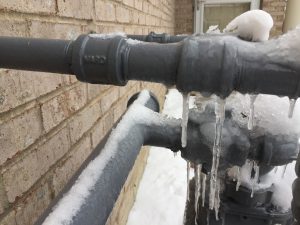Tips to Defend Your Pipes from Freezing: Specialist Tips
Call TodayWhat're your thoughts regarding Prevent Frozen Pipes ?

Winter can damage your pipes, especially by freezing pipelines. Below's exactly how to prevent it from taking place and what to do if it does.
Intro
As temperature levels drop, the threat of frozen pipelines rises, potentially causing pricey fixings and water damage. Comprehending just how to prevent frozen pipes is essential for house owners in cool climates.
Avoidance Tips
Insulating prone pipelines
Cover pipelines in insulation sleeves or utilize heat tape to shield them from freezing temperature levels. Concentrate on pipes in unheated or external areas of the home.
Home heating methods
Keep interior areas adequately heated, especially locations with plumbing. Open closet doors to allow warm air to distribute around pipes under sinks.
Just how to identify icy pipes
Seek decreased water circulation from taps, uncommon smells or sounds from pipes, and noticeable frost on subjected pipelines.
Long-Term Solutions
Architectural changes
Think about rerouting pipelines away from outside wall surfaces or unheated areas. Include added insulation to attic rooms, basements, and crawl spaces.
Upgrading insulation
Purchase high-quality insulation for pipes, attic rooms, and wall surfaces. Appropriate insulation assists keep regular temperatures and minimizes the risk of frozen pipelines.
Securing Outdoor Plumbing
Garden hoses and outdoor faucets
Disconnect and drain pipes garden pipes before winter months. Set up frost-proof faucets or cover exterior faucets with shielded caps.
Recognizing Frozen Pipes
What causes pipes to ice up?
Pipes freeze when revealed to temperature levels listed below 32 ° F (0 ° C) for extended periods. As water inside the pipelines ices up, it increases, putting pressure on the pipeline wall surfaces and potentially triggering them to rupture.
Dangers and damages
Icy pipelines can result in water system disruptions, property damage, and costly repair services. Ruptured pipes can flood homes and create extensive structural damages.
Indications of Frozen Piping
Identifying icy pipes early can avoid them from bursting.
What to Do If Your Pipes Freeze
Immediate actions to take
If you think icy pipes, maintain taps open up to relieve pressure as the ice thaws. Make use of a hairdryer or towels taken in warm water to thaw pipes gradually.
Verdict
Protecting against icy pipes calls for positive procedures and fast feedbacks. By recognizing the reasons, signs, and safety nets, house owners can secure their plumbing throughout cold weather.
Helpful Tips to Prevent Frozen Pipes this Winter
UNDERSTANDING THE BASICS: WHY PIPES FREEZE AND WHY IT’S A PROBLEM
Water freezing inside pipes is common during the winter months, but understanding why pipes freeze, and the potential problems it can cause is crucial in preventing such incidents. This section will delve into the basics of why pipes freeze and the associated problems that may arise.
THE SCIENCE BEHIND FROZEN PIPES
When water reaches freezing temperatures, it undergoes a physical transformation and solidifies into ice. This expansion of water as it freezes is the primary reason pipes can burst. As the water inside the pipe freezes, it expands, creating immense pressure on the walls. If the pressure becomes too great, the pipe can crack or rupture, leading to leaks and water damage.
FACTORS THAT CONTRIBUTE TO PIPE FREEZING
Low Temperatures: Extremely cold weather, especially below freezing, increases the risk of pipes freezing. Uninsulated or Poorly Insulated Pipes: Pipes located in unheated areas, such as basements, crawl spaces, or attics, are more prone to freezing. Insufficient insulation or lack of insulation altogether exacerbates the problem. Exterior Wall Exposure: Pipes running along exterior walls are susceptible to freezing as they encounter colder temperatures outside. Lack of Heating or Temperature Regulation: Inadequate heating or inconsistent temperature control in your home can contribute to frozen pipes. PROBLEMS CAUSED BY FROZEN PIPES
- Pipe Bursting: As mentioned earlier, the expansion of water as it freezes can cause pipes to burst, resulting in significant water damage.
- Water Damage: When pipes burst, it can lead to flooding and water damage to your property, including walls, ceilings, flooring, and personal belongings.
- Structural Damage: Prolonged exposure to water from burst pipes can compromise the structural integrity of your home, leading to costly repairs.
- Mold and Mildew Growth: Excess moisture from water damage can create a favorable environment for mold and mildew growth, posing health risks to occupants.
- Disrupted Water Supply: Frozen pipes can also result in a complete or partial loss of water supply until the issue is resolved.
WHY CERTAIN PIPES ARE MORE PRONE TO FREEZING
- Location: Pipes located in unheated or poorly insulated areas, such as basements, crawl spaces, attics, or exterior walls, are at higher risk of freezing.
- Exterior Pipes: Outdoor pipes, such as those used for irrigation or exposed plumbing, are particularly vulnerable to freezing as they are directly exposed to the elements.
- Supply Lines: Pipes that carry water from the main water supply into your home, including the main water line, are critical to protect as freezing in these lines can affect your entire plumbing system.
- Underground Pipes: Pipes buried underground, such as those connected to sprinkler systems or outdoor faucets, can be susceptible to freezing if not properly insulated.
https://busybusy.com/blog/helpful-tips-to-prevent-frozen-pipes-this-winter/

Do you appreciate reading about Winter Plumbing Precautions: Preventing Frozen Pipes? Place a comment below. We'd be glad to hear your thoughts about this posting. In hopes to see you back again in the near future. Liked our piece of writing? Please share it. Let other people locate it. Thanks so much for taking the time to read it.
Hire A Pro